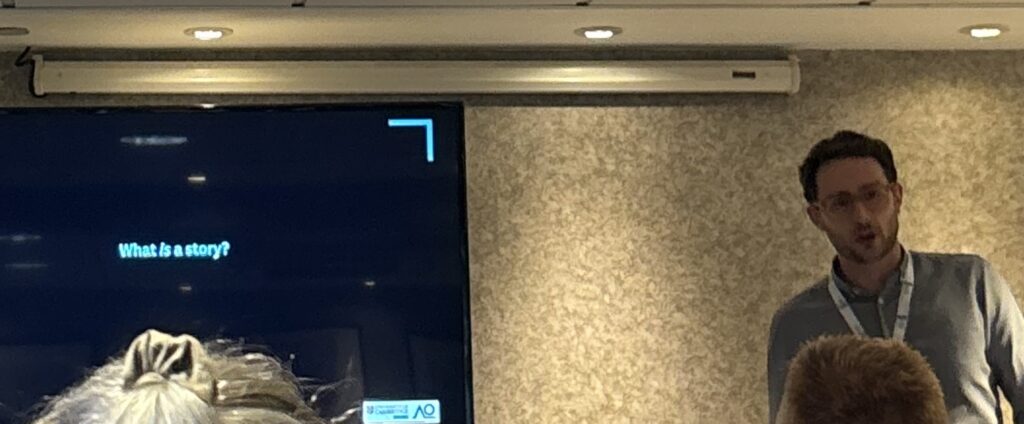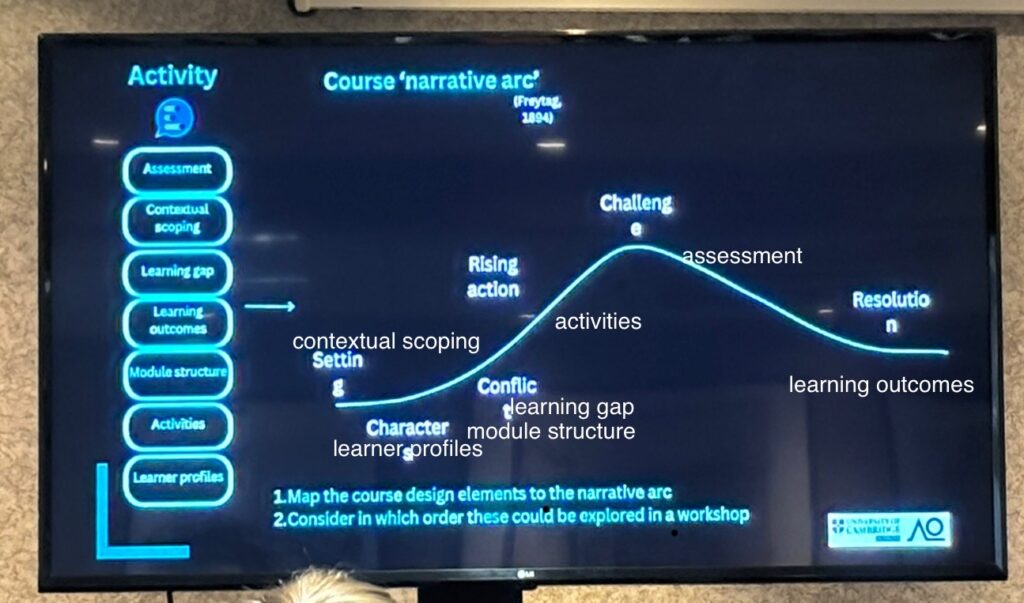Learning Technology and Storytelling at ALTC 2025
The Association of Learning Technologists Conference 2025 (ALTC) was held in Glasgow on the 23rd and 24th of October, and a contingent of us EDE team members went along to deliver papers on some of the work we’ve been doing these past years. Keynotes, paper sessions, workshops, and posters about all aspects of learning technology abounded, although there was a notable inability to avoid discourse about Generative AI for more than a few minutes at a time.
Amidst all this chatter about how we can use emergent technologies to address our field’s biggest challenges, there was one workshop in particular that turned its focus back to a much longer-established mode of communication: traditional storytelling.
Stewart Utley, a learning designer from Cambridge University Press & Assessment, led a workshop session titled The Hero’s Journey and Storytelling in Learning Design. I knew I would have a lot to say about the session by the time the first slide went up: we were asked to discuss between ourselves what we thought a story actually was.

You learn a lot about someone by their answer to this question, it turns out. Responses ranged from “something with a beginning, middle, and end” to “an account in which something significant changes” to “a narrative about people or events”, along with a variety of other criteria.
Stewart then offered us a more academic definition involving the purpose of a story, which is to forge connection and meaning collectively. A story is ideally meant to be told to and heard by someone. Ultimately, what he was suggesting is that stories are in part about engagement – a fascinating concept for me, as part of a team whose central purpose also involves engagement!
He went on to explain how the work of learning design might benefit from some reflection on storytelling practices. For example, invoking the concepts of character, conflict, resolution, and so on can encourage us to imagine the arc of a teacher and/or learner through a course or even an entire programme.
We chatted briefly about where in our current roles storytelling might already be present, or could be useful, and I was able to share a bit about our ELDeR workshops, which involve personas (characters), learner journeys (narrative arcs), and learning outcomes (thematic content). We have an opportunity, Stewart suggested, to map learning patterns onto traditional narrative structures so we might better communicate with each other about the goals and challenges of educational design, and so we can make our work a little more relational.

Storytelling also allows us to use our creative impulses to do the tough work of imagining otherwise, more crucial than ever when the future of higher education feels precariously balanced. Lola Olufemi, in her similarly titled book Experiments in Imagining Otherwise, unpacks the influence (even centrality) of story and poetry with regards to movements for change. Using the lens of the narrative arc in learning design also opens up options for considering what we could glean from alternative literary structures like the heroine’s journey or the antihero’s journey, or the expansive potential of non-Western storytelling practices.
In so many spaces at this current moment, imagining otherwise feels impossible, or futile, which is exactly why we must carry on with it. I run into this problem all the time in discussions about compassionate pedagogy, the shift towards flexible or alternative assessment styles, universal design, accessibility, and so on. The fact that we have not done something before is not always as tall a hurdle as it seems. The status quo is a powerful force, but story can be stronger.
Stewart acknowledged throughout his workshop that stories and narratives are a way of making connections, of creating shared values and culture. We tell stories to help each other, and ourselves, decide where to go next, and what to bring with us. In a conference so overwhelmed by discourse about GenAI and whether it might be a threat or a gift, or both or neither, spending an hour talking about story and teaching and learning in a relatively analogue way struck me as quite a tonic, a stabilising return to basics. We are ideally placed right now to tell our own story about the positive changes we can make in education and to imagine our own otherwise, and I certainly left ALTC looking forward to trying.



